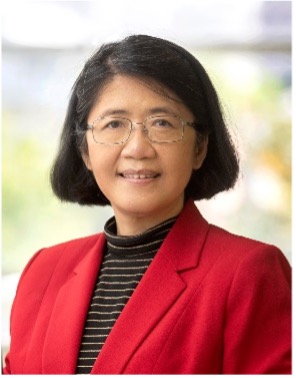Panel: Highlighting Public Safety Technologies and its Applications for a Better Future
 Public Safety is a key imperative that affects all of us especially seen last year from the wildfires in Canada that generated significant smoke that impacted the air quality across the United States or that of natural disasters like the earthquakes in Japan and Turkey.
Public Safety is a key imperative that affects all of us especially seen last year from the wildfires in Canada that generated significant smoke that impacted the air quality across the United States or that of natural disasters like the earthquakes in Japan and Turkey.
Public Safety per se is not considered a technology but comprises all the various technologies that can and do contribute to public safety needs. These range from, but not limited to communications and networking, edge and cloud computing, digital twins, IoT, blockchain, AI and machine learning, intelligent data, and augmented and virtual reality.
Emphasis will be upon presenting practical applications and their implementations of interest to attendees. Subject matter expert speakers will comment on current and past implementations all towards development for a better future.
IEEE Future Directions launched this initiative on public safety technology.
 Carolyn McGregor AM, PhD, SMIEEE, MACM is the Dean of the Faculty of Business and IT at Ontario Tech University and a two-time Canada Research Chair in Health Informatics. She is the Director of the Joint Research Centre in Artificial Intelligence for Health and Wellness between Ontario Tech University and the University of Technology, Sydney. She has led pioneering research in Big Data analytics, artificial intelligence, deep learning, the Internet of Things, temporal data mining, and cloud computing. Dr. McGregor’s leading-edge research achievements are highlighted by her international award-winning Artemis and Athena AI platforms for health, wellness, resilience and adaptation in critical care, astronaut health, firefighter training and tactical officer resilience assessment and development. She is the principal investigator on two research studies currently active on the International Space Station.
Carolyn McGregor AM, PhD, SMIEEE, MACM is the Dean of the Faculty of Business and IT at Ontario Tech University and a two-time Canada Research Chair in Health Informatics. She is the Director of the Joint Research Centre in Artificial Intelligence for Health and Wellness between Ontario Tech University and the University of Technology, Sydney. She has led pioneering research in Big Data analytics, artificial intelligence, deep learning, the Internet of Things, temporal data mining, and cloud computing. Dr. McGregor’s leading-edge research achievements are highlighted by her international award-winning Artemis and Athena AI platforms for health, wellness, resilience and adaptation in critical care, astronaut health, firefighter training and tactical officer resilience assessment and development. She is the principal investigator on two research studies currently active on the International Space Station.

 Louis Nisiotis is leading research in innovation and application of Intelligent Reality systems and eXtended Reality technologies to support and foster the ongoing digital transformation of education, industry and the society, to disrupt the way we (humans) interact with real and virtual environments, with our surroundings, and with each other. His research interests include eXtended Reality (XR), Cyber-Physical-Social Systems, Digital Twins, Serious and Entertainment Videogames, and Human Computer Interaction.
Louis Nisiotis is leading research in innovation and application of Intelligent Reality systems and eXtended Reality technologies to support and foster the ongoing digital transformation of education, industry and the society, to disrupt the way we (humans) interact with real and virtual environments, with our surroundings, and with each other. His research interests include eXtended Reality (XR), Cyber-Physical-Social Systems, Digital Twins, Serious and Entertainment Videogames, and Human Computer Interaction.
Dr Nisiotis is serving the scientific community as a Steering Committee Member of the IEEE Metaverse scientific community. He is a review editor and editorial member of prestigious scientific journals and conferences. He was the General Chair of the IEEE International Conference on Intelligent Reality (IEEE ICIR 2022) and contributes to scientific conference organizations through multiple volunteering roles. He is a member of the IEEE, IEEE Computer Society, ACM, Eurographics and Immersive Learning Research Network, and a Fellow of the UK Higher Education Academy. He is the Program Lead for BSc Computing at the University of Central Lancashire, Cyprus, delivering the Games Development and advanced Computer Graphics modules.
 May Dongmei Wang is Wallace H. Coulter Distinguished Faculty Fellow and full professor of Biomedical Engineering, Electrical and Computer Engineering, Computational Science and Engineering at Georgia Institute of Technology (GT) and Emory University (EU). She is Director of Biomedical Big Data Initiative, Georgia Distinguished Cancer Scholar, Petit Institute Faculty Fellow, Kavli Fellow, AIMBE Fellow, IAMBE Fellow, IEEE Fellow, and Board of Directors of American Board of AI in Medicine. Her research is in Biomedical Big Data with AI-Driven Intelligent Reality (IR) for predictive, personalized, and precision health (pHealth). She has 20+ years academic professorship and ~4 years industrial research experience, published 290+ articles in referred journals and conference proceedings with 15,000+ Google Scholar citations, and delivered 280+ invited and keynote lectures. Dr. Wang received BEng from Tsinghua University China, and MS with PhD degrees from GT. She is a recipient of GT Outstanding Faculty Mentor for Undergrad Research Award, and EU MilliPub Award (for a high-impact paper that is cited over 1,000 times). At Georgia Tech, Dr. Wang is in 2022 President Leading Women Program and 2021 Provost Emerging Leaders Program. Before 2016, Dr. Wang was Director of Bioinformatics and Biocomputing Core in NIH/NCI-sponsored U54 Center for Cancer Nanotechnology Excellence, and Co-Director of GT Center of Bio-Imaging Mass Spectrometry for over 10 years. Dr. Wang is the Senior Editor for IEEE Journal of Biomedical & Health Informatics (J-BHI, Impact Factor 7.02), an Associate Editor for IEEE Transactions for BME and IEEE Reviews for BME, a panelist for NIH CDMA (Clinical Data Management and Analysis) Study Section, NSF Smart and Connect Health, Brain Canada every year. She organized IEEE-JBHI Special Issue on AI-driven Informatics, Sensing, Imaging and Big Data Analytics for Fighting the COVID-19 Pandemic. Dr. Wang has chaired IEEE Biomedical and Health Informatics (BHI) community and ACM Special Interest Group in Bioinformatics. Currently, Dr. Wang serves in both IEEE Future Directions Committee and International Academy of Medical and Biological Engineering (IAMBE) Executive Committee and is IEEE-Engineering in Medicine and Biology Society (IEEE-EMBS) Vice President.
May Dongmei Wang is Wallace H. Coulter Distinguished Faculty Fellow and full professor of Biomedical Engineering, Electrical and Computer Engineering, Computational Science and Engineering at Georgia Institute of Technology (GT) and Emory University (EU). She is Director of Biomedical Big Data Initiative, Georgia Distinguished Cancer Scholar, Petit Institute Faculty Fellow, Kavli Fellow, AIMBE Fellow, IAMBE Fellow, IEEE Fellow, and Board of Directors of American Board of AI in Medicine. Her research is in Biomedical Big Data with AI-Driven Intelligent Reality (IR) for predictive, personalized, and precision health (pHealth). She has 20+ years academic professorship and ~4 years industrial research experience, published 290+ articles in referred journals and conference proceedings with 15,000+ Google Scholar citations, and delivered 280+ invited and keynote lectures. Dr. Wang received BEng from Tsinghua University China, and MS with PhD degrees from GT. She is a recipient of GT Outstanding Faculty Mentor for Undergrad Research Award, and EU MilliPub Award (for a high-impact paper that is cited over 1,000 times). At Georgia Tech, Dr. Wang is in 2022 President Leading Women Program and 2021 Provost Emerging Leaders Program. Before 2016, Dr. Wang was Director of Bioinformatics and Biocomputing Core in NIH/NCI-sponsored U54 Center for Cancer Nanotechnology Excellence, and Co-Director of GT Center of Bio-Imaging Mass Spectrometry for over 10 years. Dr. Wang is the Senior Editor for IEEE Journal of Biomedical & Health Informatics (J-BHI, Impact Factor 7.02), an Associate Editor for IEEE Transactions for BME and IEEE Reviews for BME, a panelist for NIH CDMA (Clinical Data Management and Analysis) Study Section, NSF Smart and Connect Health, Brain Canada every year. She organized IEEE-JBHI Special Issue on AI-driven Informatics, Sensing, Imaging and Big Data Analytics for Fighting the COVID-19 Pandemic. Dr. Wang has chaired IEEE Biomedical and Health Informatics (BHI) community and ACM Special Interest Group in Bioinformatics. Currently, Dr. Wang serves in both IEEE Future Directions Committee and International Academy of Medical and Biological Engineering (IAMBE) Executive Committee and is IEEE-Engineering in Medicine and Biology Society (IEEE-EMBS) Vice President.
Dr. Wang’s research has been supported by NIH, NSF, CDC, VA, Georgia Research Alliance, Georgia Cancer Coalition, Shriners’ Hospitals for Children, Children’s Health Care of Atlanta, Enduring Heart Foundation, Coulter Foundation, Imlay Foundation, Microsoft Research, HP, UCB, and Amazon.
 Kathy Grise, Senior Program Director – IEEE Future Directions, supports new technology initiatives, is the IEEE staff program director for the Public Safety Technology Initiative, the IEEE Technology Navigator AI, Future Directions and Industry Advisory Board Committees, Global Semiconductors, Technology Roadmaps, and manages the digital presence team for Future Directions. Previous initiatives included digital reality, big data and cloud computing. Ms. Grise serves as the Technical Program Chair of the IEEE COMPSAC 2024 Symposium – Data Sciences, Analytics, & Technologies (DSAT). Prior to joining the IEEE staff, Ms. Grise held numerous positions at IBM, and most recently was a Senior Engineering Manager for Process Design Kit Enablement in the IBM Semiconductor Research and Development Center. Ms. Grise led the overall IT infrastructure implementation, and software development in support of semiconductor device modeling verification, packaging, and delivery; device measurement and characterization data collection and management, and automation for device modeling engineers. Ms. Grise is a graduate of Washington and Jefferson College, and an IEEE Senior member.
Kathy Grise, Senior Program Director – IEEE Future Directions, supports new technology initiatives, is the IEEE staff program director for the Public Safety Technology Initiative, the IEEE Technology Navigator AI, Future Directions and Industry Advisory Board Committees, Global Semiconductors, Technology Roadmaps, and manages the digital presence team for Future Directions. Previous initiatives included digital reality, big data and cloud computing. Ms. Grise serves as the Technical Program Chair of the IEEE COMPSAC 2024 Symposium – Data Sciences, Analytics, & Technologies (DSAT). Prior to joining the IEEE staff, Ms. Grise held numerous positions at IBM, and most recently was a Senior Engineering Manager for Process Design Kit Enablement in the IBM Semiconductor Research and Development Center. Ms. Grise led the overall IT infrastructure implementation, and software development in support of semiconductor device modeling verification, packaging, and delivery; device measurement and characterization data collection and management, and automation for device modeling engineers. Ms. Grise is a graduate of Washington and Jefferson College, and an IEEE Senior member.
